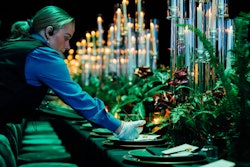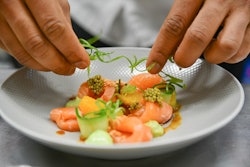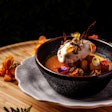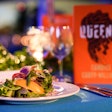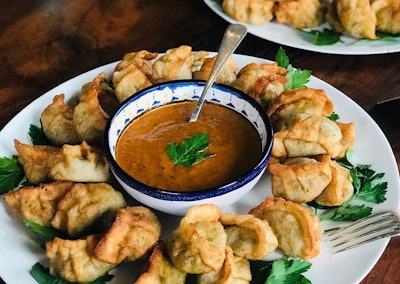
NEW YORK—“Let people tell stories with their food,” advised Liz Neumark, who founded Great Performances more than 40 years ago as a waitress-staffing agency, and facilitated its growth into one of the country’s foremost catering and hospitality companies.
Neumark was discussing the catering company's latest initiative: a new collaboration with Eat Offbeat, which refers to itself as a “social impact caterer.” Since its founding in 2015 by Lebanese immigrant Manal Kahi, Eat Offbeat has been serving up food prepared by refugees and minority immigrants from around the world who now reside in New York City.
The fast-growing company, which employs primarily home cooks, recently opened its first eatery, located in Manhattan’s famed Chelsea Market—and had been looking for a way to continue expanding without sacrificing the authenticity of its food.
“Since its inception in 2015, Eat Offbeat has been committed to creating quality jobs for refugees, building meaningful connections with our new neighbors, and telling a more positive story about immigration,” explained Kahi. “Collaborating with Great Performances will help us further our mission by allowing us to connect with far more New Yorkers."
 From left: Eat Offbeat founder Manal Kahi, Great Performances founder Liz NeumarkPhoto: Courtesy of Subjects
From left: Eat Offbeat founder Manal Kahi, Great Performances founder Liz NeumarkPhoto: Courtesy of Subjects
The new business model aims to foster growth through collaboration, said the teams, with both companies maintaining their distinct identities while blending their different resources. Great Performances has assumed Eat Offbeat’s catering-related costs and responsibilities, for example, and has hired the company’s four full-time chefs—who will in turn work to incorporate their Senegalese, Sri Lankan, Venezuelan, and Burmese home cooking traditions, ingredients, and techniques into Great Performances' menus.
In addition to providing unique new offerings to clients, the Eat Offbeat chefs will also be cycled into Great Performances' signature "People’s Kitchen" program, which, on a weekly basis, presents the company’s workplace dining clients with menu items that represent the diversity of New York City’s culinary culture. "Eat Offbeat’s mission speaks to who we are as an inclusive organization," said Neumark.
BizBash caught up with Neumark and Kahi to learn more about the collaboration, along with their advice for using food to ensure cultural authenticity at events.
How did this collaboration come about, and why did it feel like the right fit for both companies?
Liz Neumark, Great Performances: I had known of Eat Offbeat for the last few years and was impressed by its mission. Last summer, I was at an event and was talking to Sarah Holloway, an Eat Offbeat board member and sort-of mentor to founder Manal Kahi. She started talking about Manal’s incredible food, and that led to a conversation between the three of us.
Manal began talking about the aspects of the business she enjoys—the actual running of it not being one of them! That prompted me to think about how we could help them grow, and that our clients would like what Eat Offbeat brings to the table. I saw an opportunity for a win-win for both companies, starting with the fact that Eat Offbeat needed space, and we had it.
Manal Kahi, Eat Offbeat: We were coming out of the pandemic, during which we had pivoted from catering to direct-to-consumer initiatives. We had to make a decision about whether or not we would return to catering or continue to grow the direct-to-consumer operation. And we had to make that decision with very limited resources.
With Great Performances, there was an opportunity to grow back the catering and still grow the direct-to-consumer. We wouldn’t have to choose one or the other, given the access to GP’s amazing resources. I felt a personal connection with Liz, and knew our mission would be safe in her hands.
Why did you decide to have each company maintain its distinct brand identity?
Kahi: We’ve been developing our brand since 2015 and have gained a loyal following, both as clients for our food and supporters of our mission. The collaboration with GP amplifies our mission while allowing us to maintain our integrity and authenticity. We’re not just a food company—we’re more about the community we represent.
The way we work is different from a large-scale operation, and our brand reflects that. We are keeping our small scale, and continuing to assure the pride infused in our food remains unparalleled, by keeping chefs completely responsible for each of their dishes.
Neumark: There was nothing to be gained by consolidating. Both entities have stories to tell that complement each other. Why not have both brands out there telling those stories? We’re stronger as two brands working together.  In addition to quality food, Great Performances focuses on creative, eye-catching presentations at events. "People eat with their eyes first," says Neumark.Photo: Courtesy of Great Performances
In addition to quality food, Great Performances focuses on creative, eye-catching presentations at events. "People eat with their eyes first," says Neumark.Photo: Courtesy of Great Performances
Through the collaboration, GP will now offer the "Eat Offbeat Station" as an option for its events. What do you think will make an option like that appealing to event organizers?
Neumark: It starts with the deliciousness of the food and the story behind it. We animate it like we do all our stations with creative, eye-catching presentations—[because] people eat with their eyes first. The Eat Offbeat Station will be designed for each event to complement the rest of the food. It gives event organizers the opportunity to introduce such deliciously different food to their guests, who are increasingly interested in exploring. It distinguishes the culinary aspect of an event by presenting something that is really unique.
Kahi: It reflects authenticity and diversity, changing to complement GP’s seasonal menus. We also provide dishes that are incorporated into other stations or presented as a course for a seated meal menu.
Cultural authenticity—and how to get it right—is a hot topic at events these days. How do you think an offering like Eat Offbeat can help events be more culturally authentic?
Kahi: Cultural authenticity is a very important element of our brand’s DNA. It’s the foundation of everything we do.
Neumark: By its very presence, Eat Offbeat brings an uncommon degree of it to an event. Eat Offbeat’s chefs grew up with and have lived their food, which is rooted in generations of culinary memory. They know exactly how it should taste and look.
Any other tips you’d offer to event professionals about creating their own culturally authentic events, particularly when it comes to food?
Neumark: It starts with where the food is from and who’s cooking it. There’s not much ethnicity if a dish is being prepared from a recipe by someone who has never seen or tasted it. The final product may be tasty, but it may not be truly representative of what the dish is supposed to be because the person who made it doesn’t know what final touches may be needed to make it truly authentic.
Eat Offbeat’s chefs are home cooks who are cooking their food the way it’s been done for generations. They’re not doing anything differently just because they’re in our kitchen. They’re not trying to blend in with any corporate thing.
If event organizers want culturally authentic food, they need people cooking it who know it the way that is only possible with long-term, intimate knowledge of it. Let people tell stories with their food.
Kahi: Keep an open mind. You can be surprised and delighted by how other cultures do some things differently. It can be very intriguing for guests to experience new presentations and ways of service.
What are your hopes for the future of the collaboration?
Kahi: Continuing to grow together harmoniously, while maintaining our authenticity as we learn from GP and take advantage of its resources.
Neumark: Doing a lot of business together! And having some fun with it. Eat Offbeat speaks to who we are with our Peoples’ Kitchen program that offers workplace dining clients a taste of New York City’s amazing culinary diversity. Eat Offbeat is People’s Kitchen on steroids, while making a big difference in the lives of real people who have gone through great trauma.
For us, it’s not just about the party—it’s also the process, and Eat Offbeat’s is important. The collaboration affords us the ability to do a favor for our clients by introducing them to these foods.





